run flat MAZDA MODEL 6 HATCHBACK 2005 Owners Manual (in English)
[x] Cancel search | Manufacturer: MAZDA, Model Year: 2005, Model line: MODEL 6 HATCHBACK, Model: MAZDA MODEL 6 HATCHBACK 2005Pages: 340, PDF Size: 3.08 MB
Page 25 of 340
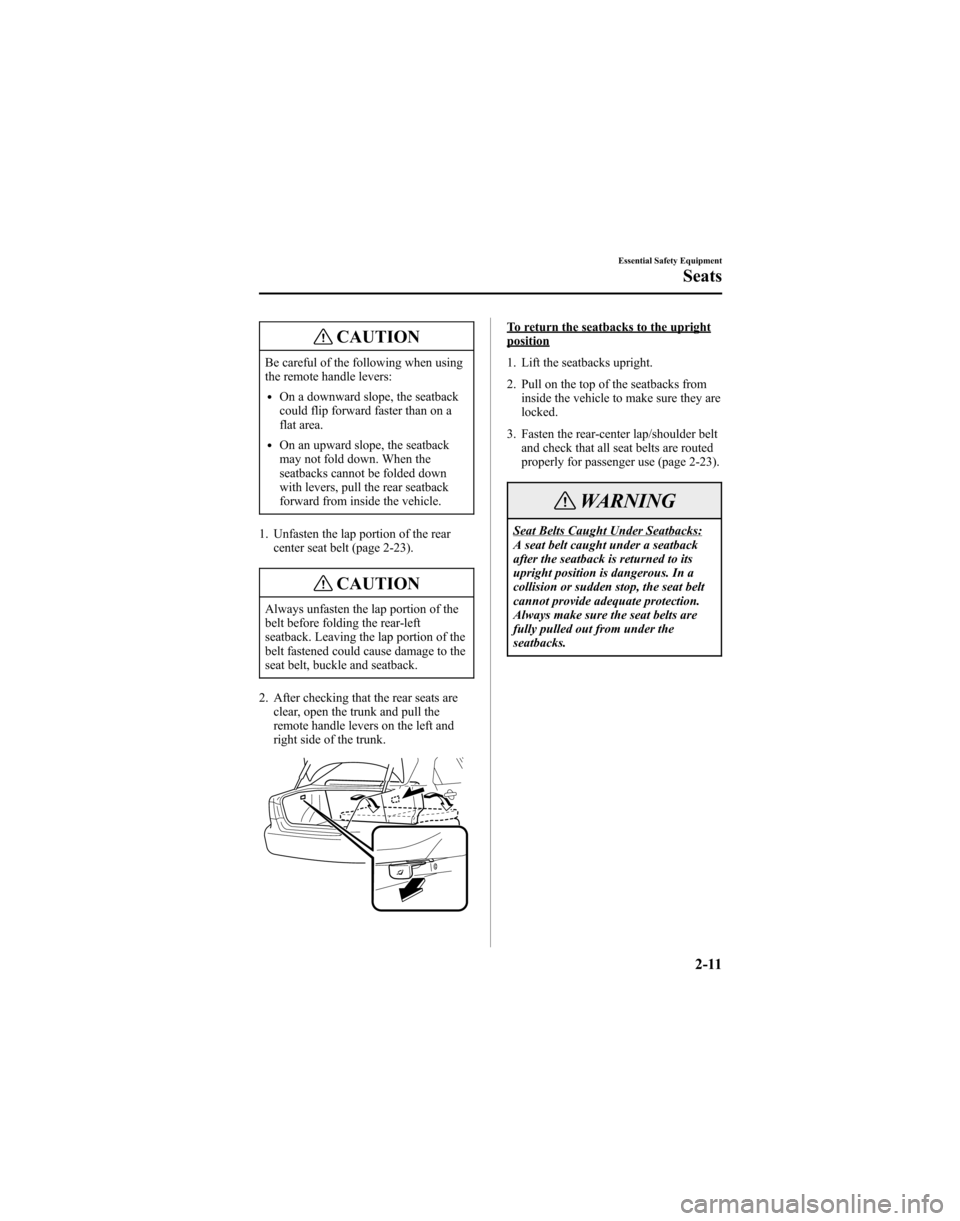
CAUTION
Be careful of the following when using
the remote handle levers:
lOn a downward slope, the seatback
could flip forward faster than on a
flat area.
lOn an upward slope, the seatback
may not fold down. When the
seatbacks cannot be folded down
with levers, pull the rear seatback
forward from inside the vehicle.
1. Unfasten the lap portion of the rear center seat belt (page 2-23).
CAUTION
Always unfasten the lap portion of the
belt before folding the rear-left
seatback. Leaving the lap portion of the
belt fastened could cause damage to the
seat belt, buckle and seatback.
2. After checking that the rear seats are clear, open the trunk and pull the
remote handle levers on the left and
right side of the trunk.
To return the seatbacks to the uprightposition
1. Lift the seatbacks upright.
2. Pull on the top of the seatbacks from inside the vehicle to make sure they are
locked.
3. Fasten the rear-center lap/shoulder belt and check that all seat belts are routed
properly for passenger use (page 2-23).
WARNING
Seat Belts Caught Under Seatbacks:
A seat belt caught under a seatback
after the seatback is returned to its
upright position is dangerous. In a
collision or sudden stop, the seat belt
cannot provide adequate protection.
Always make sure the seat belts are
fully pulled out from under the
seatbacks.
Essential Safety Equipment
Seats
2-11
Page 72 of 340
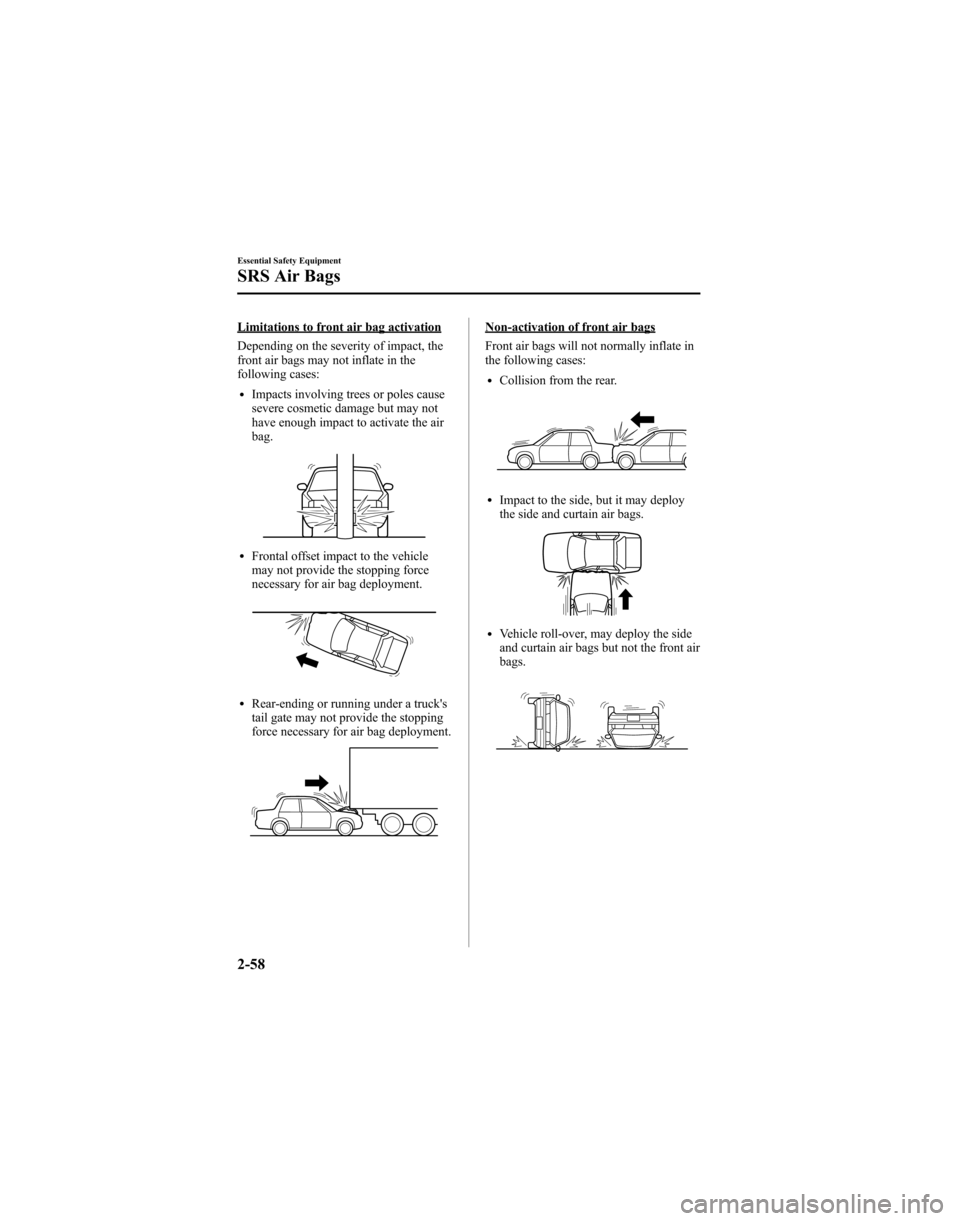
Limitations to front air bag activation
Depending on the severity of impact, the
front air bags may not inflate in the
following cases:
lImpacts involving trees or poles cause
severe cosmetic damage but may not
have enough impact to activate the air
bag.
lFrontal offset impact to the vehicle
may not provide the stopping force
necessary for air bag deployment.
lRear-ending or running under a truck's
tail gate may not provide the stopping
force necessary for air bag deployment.
Non-activation of front air bags
Front air bags will not normally inflate in
the following cases:
lCollision from the rear.
lImpact to the side, but it may deploy
the side and curtain air bags.
lVehicle roll-over, may deploy the side
and curtain air bags but not the front air
bags.
2-58
Essential Safety Equipment
SRS Air Bags
Page 119 of 340
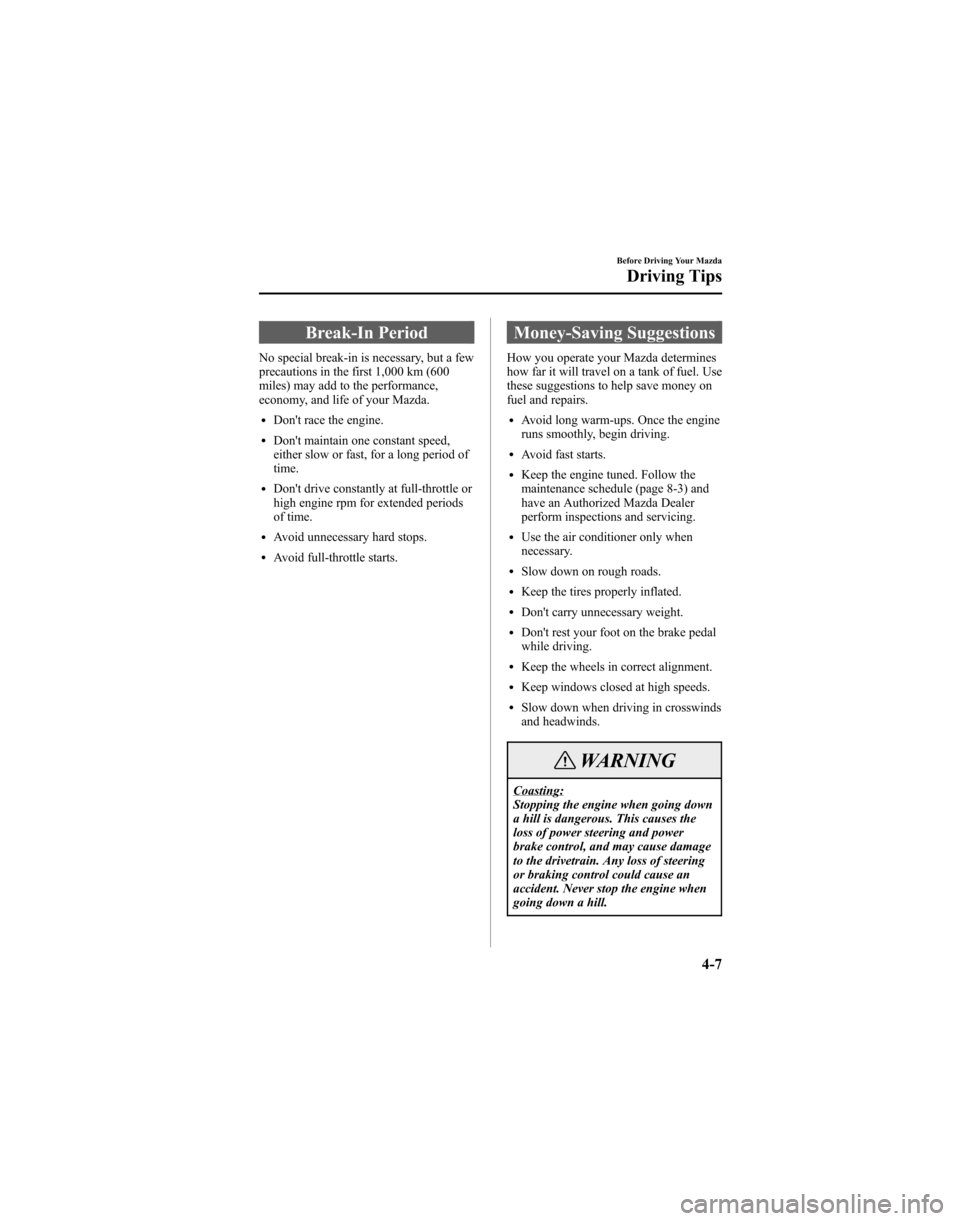
Break-In Period
No special break-in is necessary, but a few
precautions in the first 1,000 km (600
miles) may add to the performance,
economy, and life of your Mazda.
lDon't race the engine.
lDon't maintain one constant speed,
either slow or fast, for a long period of
time.
lDon't drive constantly at full-throttle or
high engine rpm for extended periods
of time.
lAvoid unnecessary hard stops.
lAvoid full-throttle starts.
Money-Saving Suggestions
How you operate your Mazda determines
how far it will travel on a tank of fuel. Use
these suggestions to help save money on
fuel and repairs.
lAvoid long warm-ups. Once the engine
runs smoothly, begin driving.
lAvoid fast starts.
lKeep the engine tuned. Follow the
maintenance schedule (page 8-3) and
have an Authorized Mazda Dealer
perform inspections and servicing.
lUse the air conditioner only when
necessary.
lSlow down on rough roads.
lKeep the tires properly inflated.
lDon't carry unnecessary weight.
lDon't rest your foot on the brake pedal
while driving.
lKeep the wheels in correct alignment.
lKeep windows closed at high speeds.
lSlow down when driving in crosswinds
and headwinds.
WARNING
Coasting:
Stopping the engine when going down
a hill is dangerous. This causes the
loss of power steering and power
brake control, and may cause damage
to the drivetrain. Any loss of steering
or braking control could cause an
accident. Never stop the engine when
going down a hill.
Before Driving Your Mazda
Driving Tips
4-7
Page 233 of 340
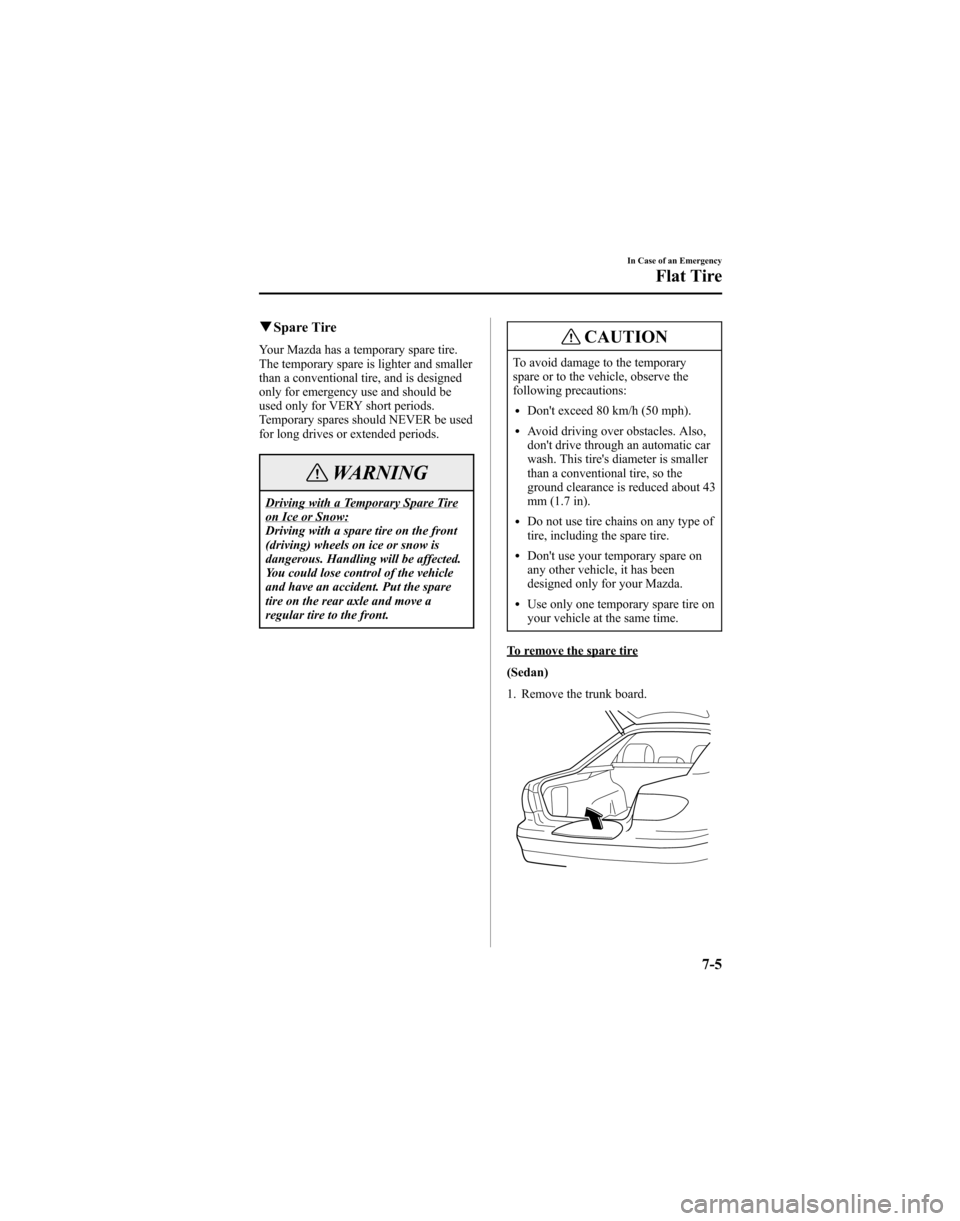
qSpare Tire
Your Mazda has a temporary spare tire.
The temporary spare is lighter and smaller
than a conventional tire, and is designed
only for emergency use and should be
used only for VERY short periods.
Temporary spares should NEVER be used
for long drives or extended periods.
WARNING
Driving with a Temporary Spare Tireon Ice or Snow:
Driving with a spare tire on the front
(driving) wheels on ice or snow is
dangerous. Handling will be affected.
You could lose control of the vehicle
and have an accident. Put the spare
tire on the rear axle and move a
regular tire to the front.
CAUTION
To avoid damage to the temporary
spare or to the vehicle, observe the
following precautions:
lDon't exceed 80 km/h (50 mph).
lAvoid driving over obstacles. Also,
don't drive through an automatic car
wash. This tire's diameter is smaller
than a conventional tire, so the
ground clearance is reduced about 43
mm (1.7 in).
lDo not use tire chains on any type of
tire, including the spare tire.
lDon't use your temporary spare on
any other vehicle, it has been
designed only for your Mazda.
lUse only one temporary spare tire on
your vehicle at the same time.
To remove the spare tire
(Sedan)
1. Remove the trunk board.
In Case of an Emergency
Flat Tire
7-5
Page 234 of 340
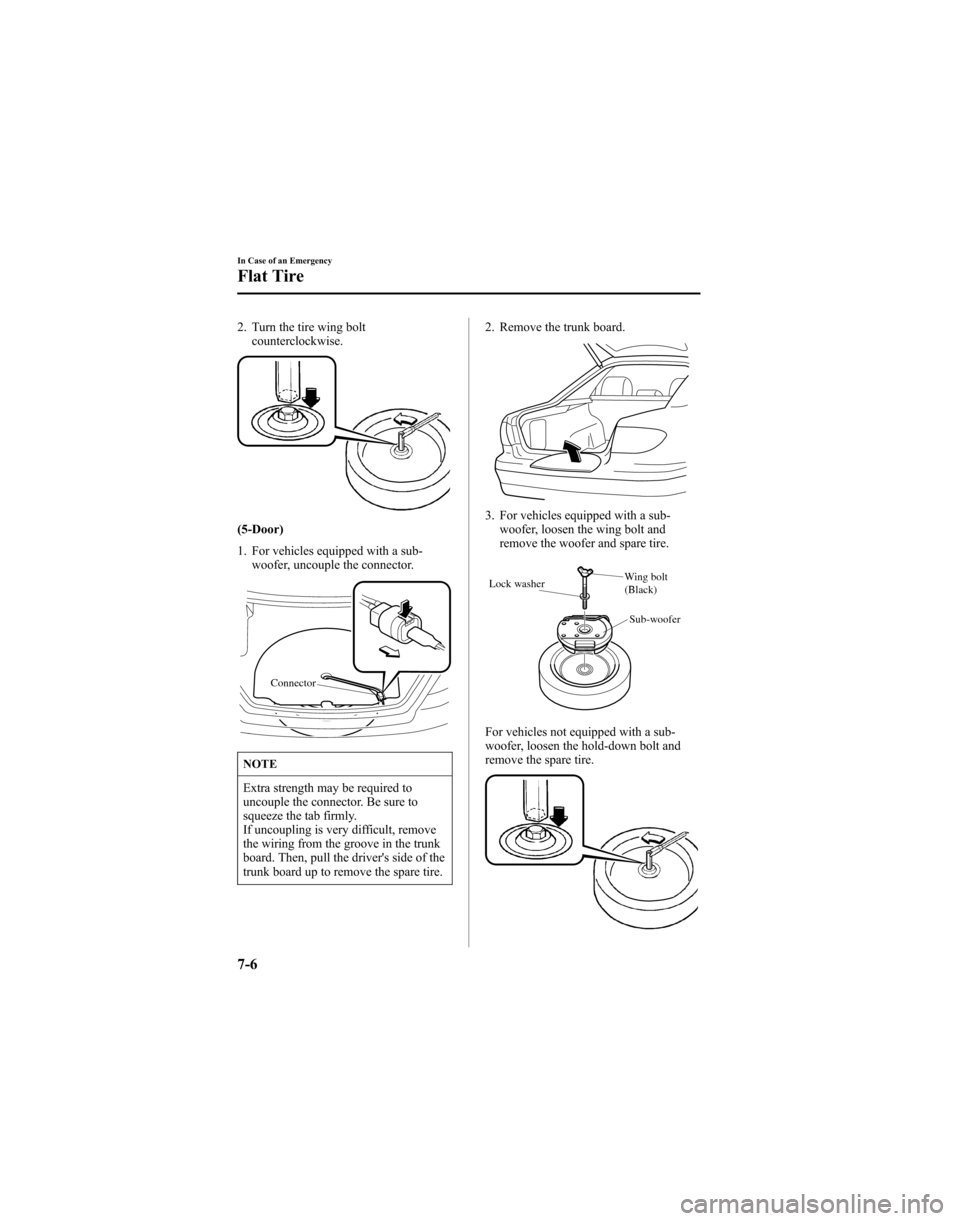
2. Turn the tire wing boltcounterclockwise.
(5-Door)
1. For vehicles equipped with a sub-woofer, uncouple the connector.
Connector
NOTE
Extra strength may be required to
uncouple the connector. Be sure to
squeeze the tab firmly.
If uncoupling is very difficult, remove
the wiring from the groove in the trunk
board. Then, pull the driver's side of the
trunk board up to remove the spare tire. 2. Remove the trunk board.
3. For vehicles equipped with a sub-
woofer, loosen the wing bolt and
remove the woofer and spare tire.
Lock washer Wing bolt
(Black)
Sub-woofer
For vehicles not equipped with a sub-
woofer, loosen the hold-down bolt and
remove the spare tire.
7-6
In Case of an Emergency
Flat Tire
Page 235 of 340
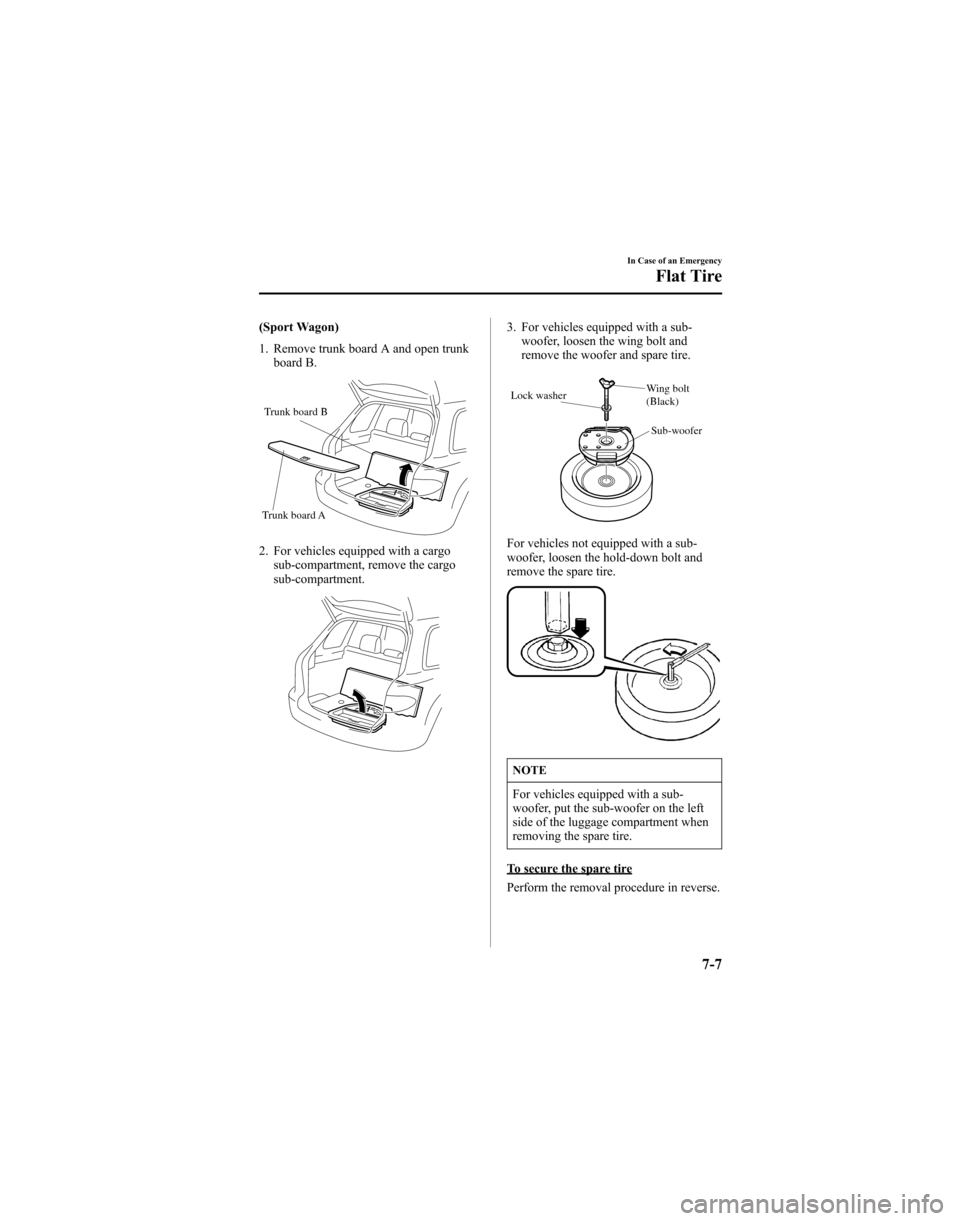
(Sport Wagon)
1. Remove trunk board A and open trunkboard B.
Trunk board B
Trunk board A
2. For vehicles equipped with a cargo sub-compartment, remove the cargo
sub-compartment.
3. For vehicles equipped with a sub- woofer, loosen the wing bolt and
remove the woofer and spare tire.
Lock washer Wing bolt
(Black)
Sub-woofer
For vehicles not equipped with a sub-
woofer, loosen the hold-down bolt and
remove the spare tire.
NOTE
For vehicles equipped with a sub-
woofer, put the sub-woofer on the left
side of the luggage compartment when
removing the spare tire.
To secure the spare tire
Perform the removal procedure in reverse.
In Case of an Emergency
Flat Tire
7-7
Page 241 of 340
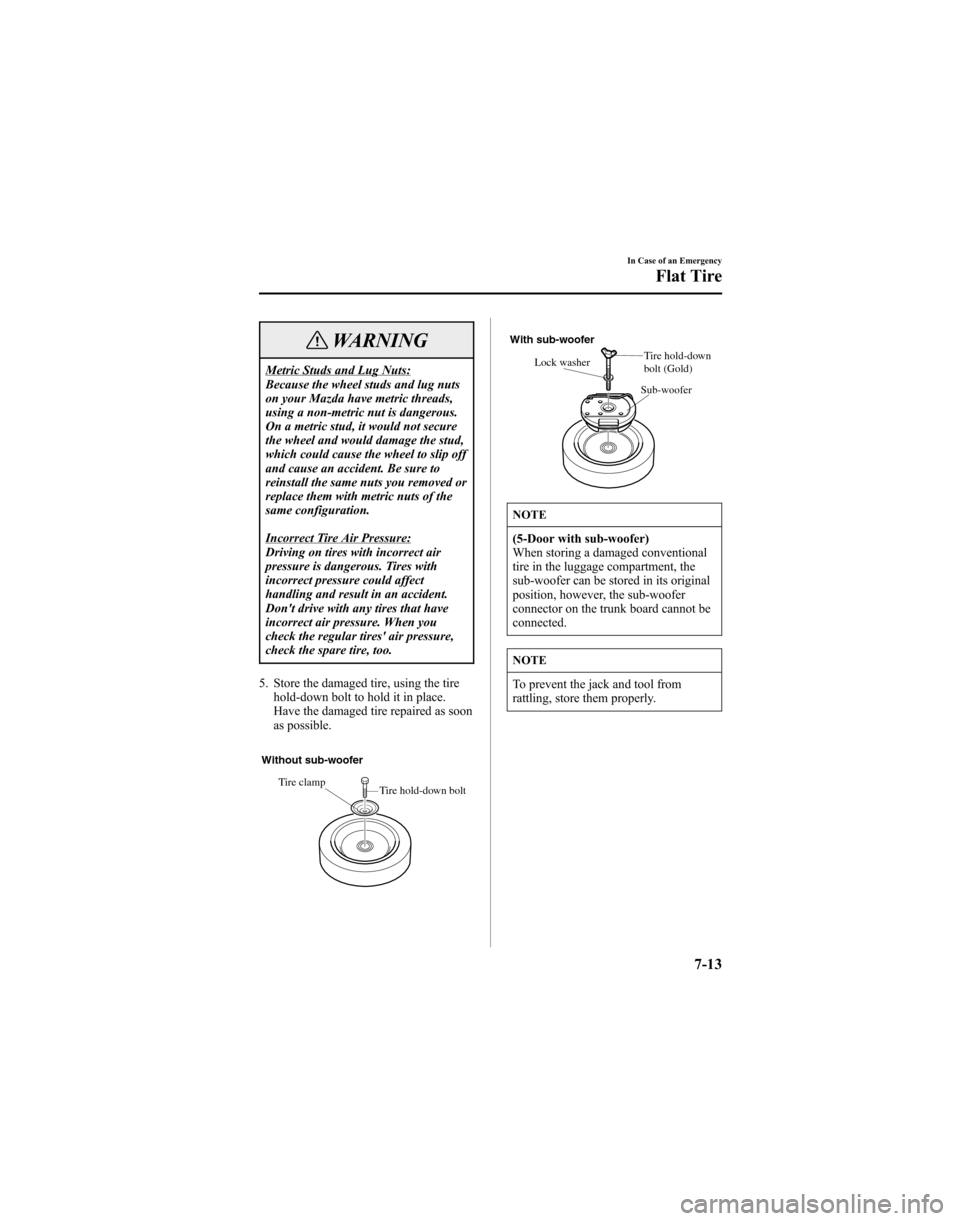
WARNING
Metric Studs and Lug Nuts:
Because the wheel studs and lug nuts
on your Mazda have metric threads,
using a non-metric nut is dangerous.
On a metric stud, it would not secure
the wheel and would damage the stud,
which could cause the wheel to slip off
and cause an accident. Be sure to
reinstall the same nuts you removed or
replace them with metric nuts of the
same configuration.
Incorrect Tire Air Pressure:
Driving on tires with incorrect air
pressure is dangerous. Tires with
incorrect pressure could affect
handling and result in an accident.
Don't drive with any tires that have
incorrect air pressure. When you
check the regular tires' air pressure,
check the spare tire, too.
5. Store the damaged tire, using the tire hold-down bolt to hold it in place.
Have the damaged tire repaired as soon
as possible.
Without sub-woofer
Tire hold-down bolt
Tire clamp
With sub-woofer
Lock washer Tire hold-down
bolt (Gold)
Sub-woofer
NOTE
(5-Door with sub-woofer)
When storing a damaged conventional
tire in the luggage compartment, the
sub-woofer can be stored in its original
position, however, the sub-woofer
connector on the trunk board cannot be
connected.
NOTE
To prevent the jack and tool from
rattling, store them properly.
In Case of an Emergency
Flat Tire
7-13
Page 331 of 340
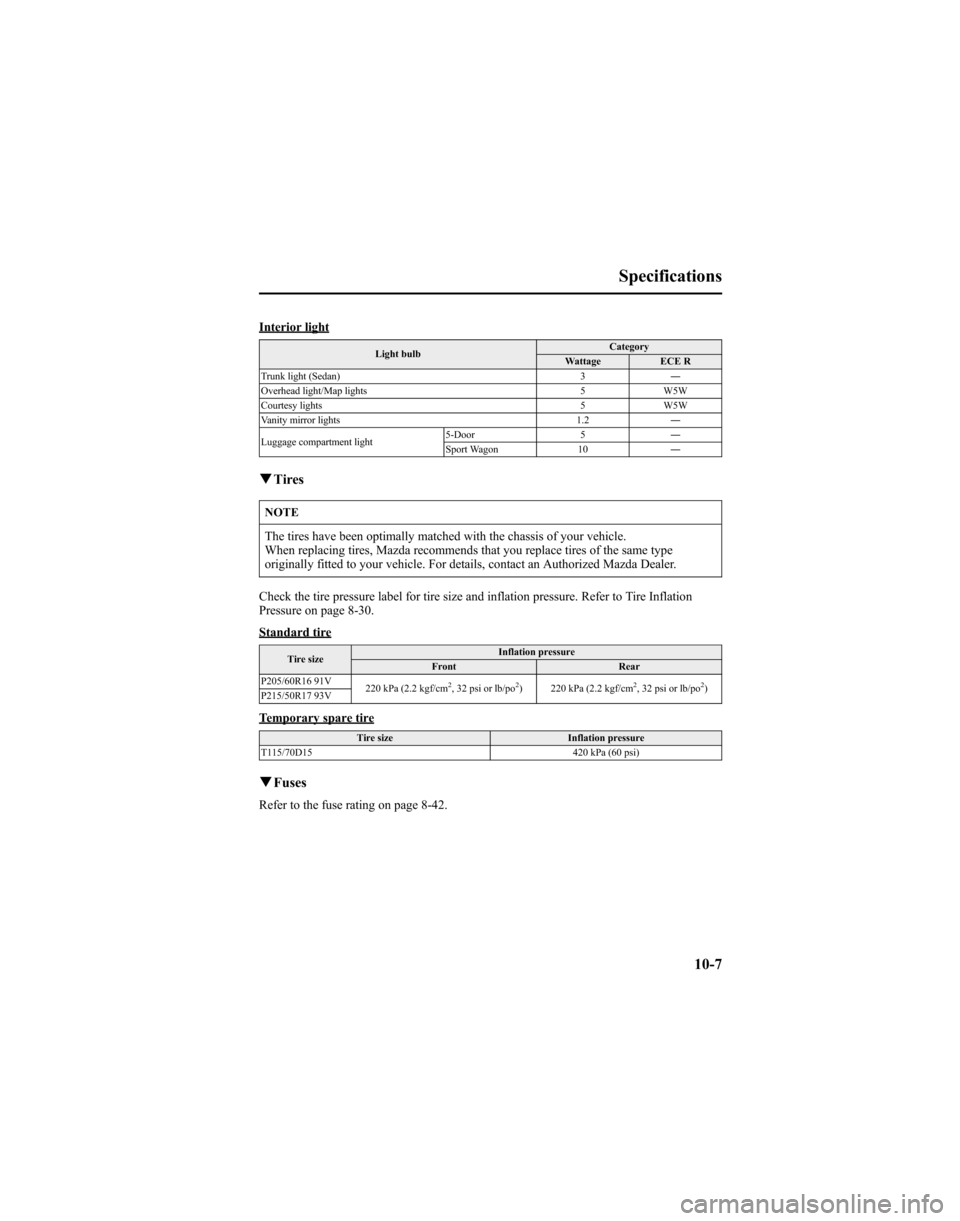
Interior light
Light bulbCategory
Wattage ECE R
Trunk light (Sedan) 3 ―
Overhead light/Map lights 5 W5W
Courtesy lights 5 W5W
Vanity mirror lights 1.2 ―
Luggage compartment light 5-Door 5
―
Sport Wagon 10 ―
qTires
NOTE
The tires have been optimally matched with the chassis of your vehicle.
When replacing tires, Mazda recommends that you replace tires of the same type
originally fitted to your vehicle. For details, contact an Authorized Mazda Dealer.
Check the tire pressure label for tire size and inflation pressure. Refer to Tire Inflation
Pressure on page 8-30.
Standard tire
Tire size Inflation pressure
Front Rear
P205/60R16 91V 220 kPa (2.2 kgf/cm
2, 32 psi or lb/po2) 220 kPa (2.2 kgf/cm2, 32 psi or lb/po2)
P215/50R17 93V
Temporary spare tire
Tire size Inflation pressure
T115/70D15 420 kPa (60 psi)
q Fuses
Refer to the fuse rating on page 8-42.
Specifications
10-7
Page 335 of 340
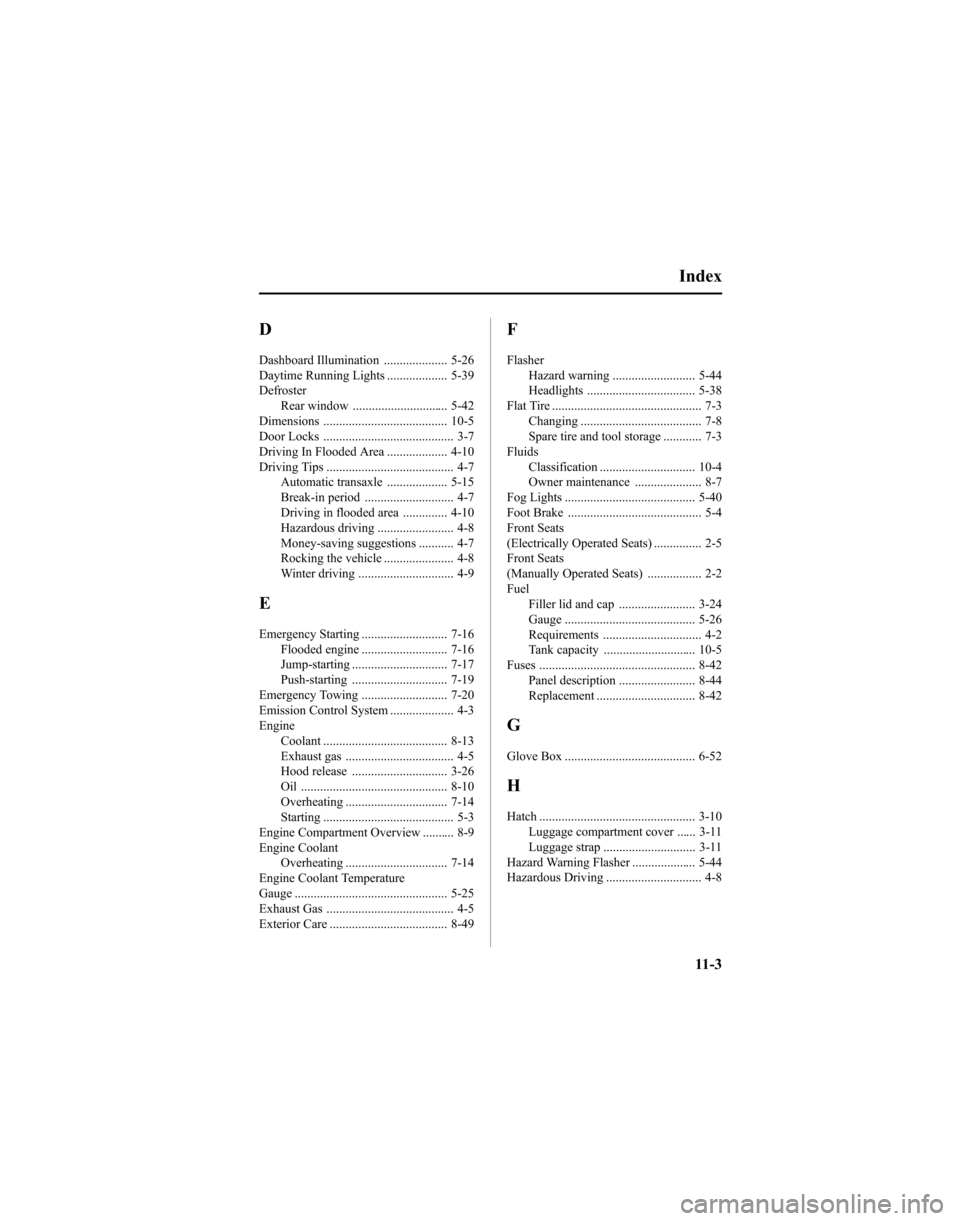
D
Dashboard Illumination .................... 5-26
Daytime Running Lights ................... 5-39
DefrosterRear window .............................. 5-42
Dimensions ....................................... 10-5
Door Locks ......................................... 3-7
Driving In Flooded Area ................... 4-10
Driving Tips ........................................ 4-7 Automatic transaxle ................... 5-15
Break-in period ............................ 4-7
Driving in flooded area .............. 4-10
Hazardous driving ........................ 4-8
Money-saving suggestions ........... 4-7
Rocking the vehicle ...................... 4-8
Winter driving .............................. 4-9
E
Emergency Starting ........................... 7-16Flooded engine ........................... 7-16
Jump-starting .............................. 7-17
Push-starting .............................. 7-19
Emergency Towing ........................... 7-20
Emission Control System .................... 4-3
Engine Coolant ....................................... 8-13
Exhaust gas .................................. 4-5
Hood release .............................. 3-26
Oil .............................................. 8-10
Overheating ................................ 7-14
Starting ......................................... 5-3
Engine Compartment Overview .......... 8-9
Engine Coolant Overheating ................................ 7-14
Engine Coolant Temperature
Gauge ................................................ 5-25
Exhaust Gas ........................................ 4-5
Exterior Care ..................................... 8-49
F
Flasher Hazard warning .......................... 5-44
Headlights .................................. 5-38
Flat Tire ............................................... 7-3
Changing ...................................... 7-8
Spare tire and tool storage ............ 7-3
Fluids
Classification .............................. 10-4
Owner maintenance ..................... 8-7
Fog Lights ......................................... 5-40
Foot Brake .......................................... 5-4
Front Seats
(Electrically Operated Seats) ............... 2-5
Front Seats
(Manually Operated Seats) ................. 2-2
Fuel
Filler lid and cap ........................ 3-24
Gauge ......................................... 5-26
Requirements ............................... 4-2
Tank capacity ............................. 10-5
Fuses ................................................. 8-42 Panel description ........................ 8-44
Replacement ............................... 8-42
G
Glove Box ......................................... 6-52
H
Hatch ................................................. 3-10Luggage compartment cover ...... 3-11
Luggage strap ............................. 3-11
Hazard Warning Flasher .................... 5-44
Hazardous Driving .............................. 4-8
Index
11-3
Page 338 of 340
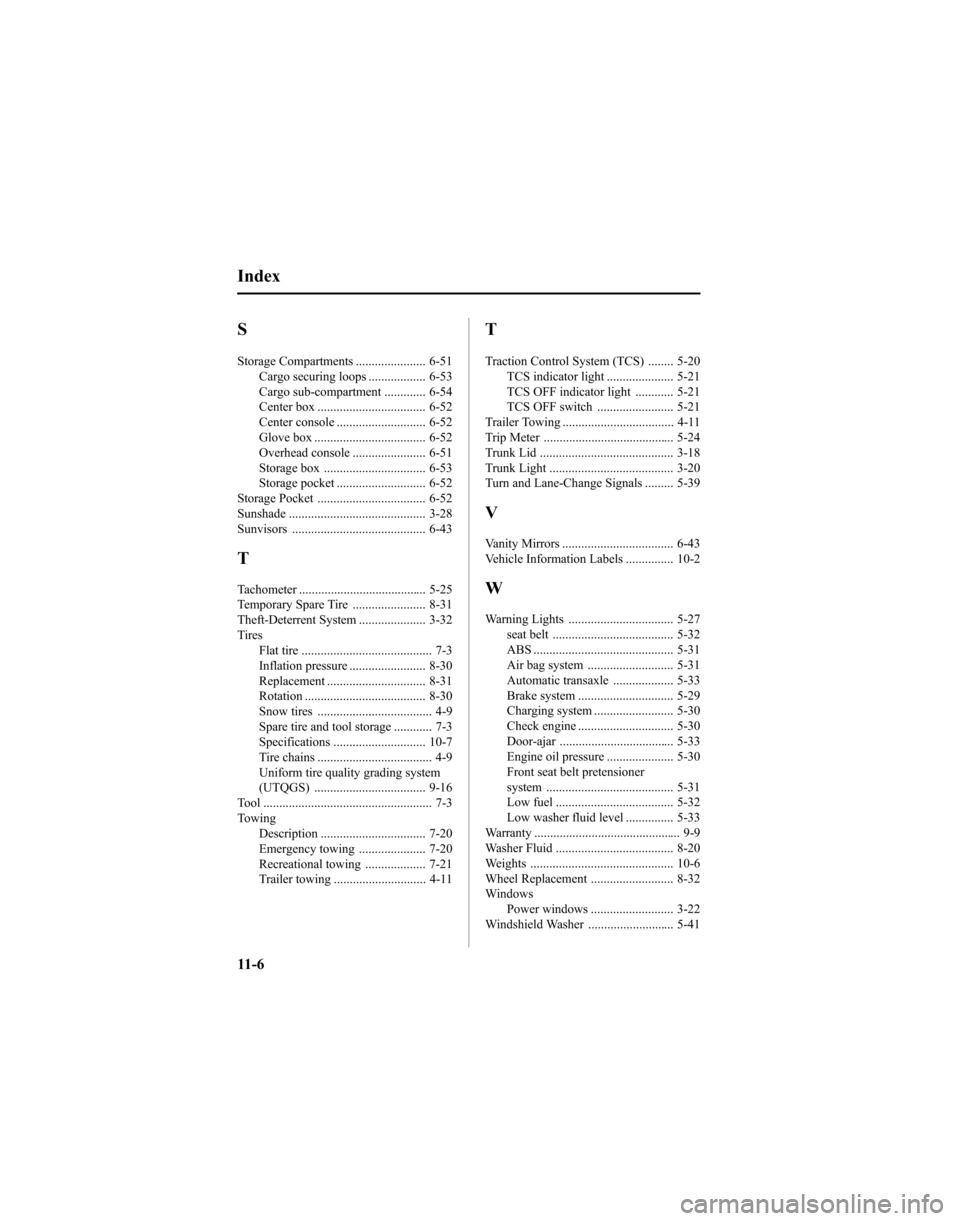
S
Storage Compartments ...................... 6-51Cargo securing loops .................. 6-53
Cargo sub-compartment ............. 6-54
Center box .................................. 6-52
Center console ............................ 6-52
Glove box ................................... 6-52
Overhead console ....................... 6-51
Storage box ................................ 6-53
Storage pocket ............................ 6-52
Storage Pocket .................................. 6-52
Sunshade ........................................... 3-28
Sunvisors .......................................... 6-43
T
Tachometer ........................................ 5-25
Temporary Spare Tire ....................... 8-31
Theft-Deterrent System ..................... 3-32
Tires
Flat tire ......................................... 7-3
Inflation pressure ........................ 8-30
Replacement ............................... 8-31
Rotation ...................................... 8-30
Snow tires .................................... 4-9
Spare tire and tool storage ............ 7-3
Specifications ............................. 10-7
Tire chains .................................... 4-9
Uniform tire quality grading system
(UTQGS) ................................... 9-16
Tool ..................................................... 7-3
Towing Description ................................. 7-20
Emergency towing ..................... 7-20
Recreational towing ................... 7-21
Trailer towing ............................. 4-11
T
Traction Control System (TCS) ........ 5-20
TCS indicator light ..................... 5-21
TCS OFF indicator light ............ 5-21
TCS OFF switch ........................ 5-21
Trailer Towing ................................... 4-11
Trip Meter ......................................... 5-24
Trunk Lid .......................................... 3-18
Trunk Light ....................................... 3-20
Turn and Lane-Change Signals ......... 5-39
V
Vanity Mirrors ................................... 6-43
Vehicle Information Labels ............... 10-2
W
Warning Lights ................................. 5-27 seat belt ...................................... 5-32
ABS ............................................ 5-31
Air bag system ........................... 5-31
Automatic transaxle ................... 5-33
Brake system .............................. 5-29
Charging system ......................... 5-30
Check engine .............................. 5-30
Door-ajar .................................... 5-33
Engine oil pressure ..................... 5-30
Front seat belt pretensioner
system ........................................ 5-31
Low fuel ..................................... 5-32
Low washer fluid level ............... 5-33
Warranty .............................................. 9-9
Washer Fluid ..................................... 8-20
Weights ............................................. 10-6
Wheel Replacement .......................... 8-32
Windows
Power windows .......................... 3-22
Windshield Washer ........................... 5-41
11-6
Index